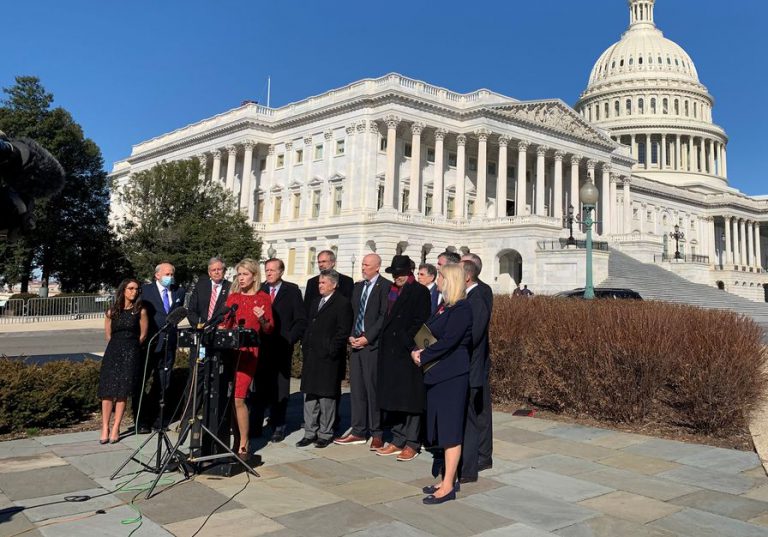WASHINGTON — Illinois lawmakers voted along party lines Thursday, as the House of Representatives voted 224-206 to pass H.R. 5, titled the Equality Act, a bill to protect LGBTQ Americans from discrimination.
Listen to this story here.
An earlier version of the bill passed the House once before in 2019, with the support of eight Republicans, only to be blocked in the Republican-led Senate. This time, the measure received support from just three Republicans, none of them from Illinois. Its fate in the Senate is uncertain; Democrats hold 50 Senate seats plus the vice-president’s tie-breaking vote, but 60 votes would be needed if Republicans mount a filibuster.
Illinois Republican Mary Miller was one of the Equality Act’s more vocal Illinois opponents. The 15th District representative from Coles County gathered with other members of the conservative House Freedom Caucus outside the U.S. Capitol building Thursday morning, for a news conference against the measure.
“This co-called Equality Act is nothing but the progressive left in this country attempting to force their radical views about marriage and gender on the rest of us,” said Miller, referring to same-sex marriage and also the measure’s protections for transgender people.
The Equality Act would amend federal civil rights laws, including the 1964 Civil Rights Act and the 1968 Fair Housing Act, to give LGBTQ Americans protection from discrimination in employment, education, housing and other areas, including in states which have no such anti-discrimination laws of their own.
In providing protections for transgender people, conservative opponents claim that provisions in the Equality Act could be exploited by male sexual predators, who would claim access to women’s restrooms and locker rooms. They also argue that women and girls would be disadvantaged in sports by stronger and faster transgender athletes.
“This bill is neither safe nor fair for women or our girls, and the consequences are broad, far reaching and egregious,” said Miller, who also said the legislation endangered faith-based agencies that opposed working with same-sex couples for adoptions or foster care.
But a staff member with the LGBTQ advocacy group Equality Illinois calls such arguments red herrings. Public Policy director Mike Ziri says Illinois’ own anti-discrimination law, the Illinois Human Rights Act, has banned discrimination on the basis of sexual orientation and gender identification since 2006.
“None of the things that the opponents of the Equality Act have decried today from the steps of the capitol, those things just don’t happen,” said Ziri about Illinois’ situation under the state Human Rights Act. “And they have not happened.”
Meanwhile, in debate on the House floor Thursday, Illinois Democrats focused on the Equality Act’s central goal of ending longtime discrimination faced by LGBTQ people. Chicago Democrat Mike Quigley of Chicago criticized opponents of the measure for failing to see that LGBTQ rights are basic human rights,
“They want us to believe that protecting LGBTQ Americans somehow hurts women and girls,” said Quigley. “But they know better. And history will accurately reflect what it really is.”
Other Illinois Democrats defending H.R. 5 cited transgender members of their own families. U.S. Rep. Marie Newman mentioned her transgender daughter when she spoke in favor of the Equality Act on Tuesday. And on Thursday, Rep. Jan Schakowsky praised her transgender grandson — as well as those who have struggled for LGBTQ rights over the years.
“And I rise today to say thank you to the generations of people who have been arrested and beaten and excluded and sometimes killed for this fight,” said Schakowsky. “ Let today be the end.”
The Equality Act now once again goes to the Senate. While its chances there are better than in 2019, a possible GOP filibuster makes its future in that chamber uncertain.

